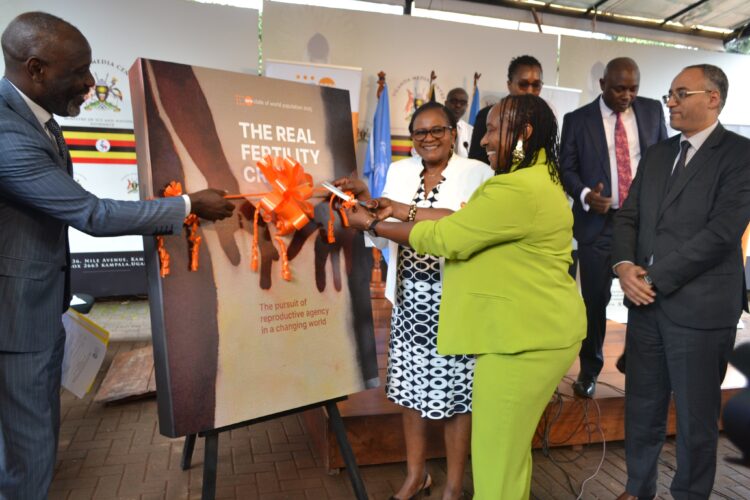By Leonard Kamugisha Akida,
KAMPALA
The United Nations Population Fund (UNFPA) has clarified that while it champions sexual and reproductive health rights (SRHR), it does not advocate for abortion as a method of family planning.
Speaking at the launch of the 2025 State of World Population Report at the Uganda Media Centre on Tuesday, Dr. Gift Malunga, the UNFPA Country Representative in Uganda, emphasized the organization’s stance.

“UNFPA is deeply rooted in human rights, including access to sexual and reproductive health information and services. However, we do not promote abortion as a means of shaping fertility,” Dr. Malunga said.
She noted that legal frameworks and cultural contexts within individual countries such as Uganda shape the extent to which abortion services can be discussed or provided.
“In Uganda, the Penal Code Act and the 2006 National Policy Guidelines and Service Standards for SRHR specify conditions for which abortion is permissable, primarily to save a woman’s life or in cases of physical and mental health illnesses,” she said.
The 2025 report reveals a sharp global decline in birth rates, attributed to the rising cost of living, gender inequality, and uncertainties about the future. It notes that many people wish to have children but are unable to, something which UNFPA describes as a global “fertility crisis.”
“One in five people globally expect not to have the number of children they desired due to economic and social barriers, rather than a lack of interest in parenthood,” the report states.
Additionally, the report indicates that reproductive autonomy is still a challenge for many. It reveals that 20% of people globally felt pressured into having children when they were not ready, while one in three adults reported experiencing an unintended pregnancy.
Uganda’s Birthrate in Decline
In Uganda, the national fertility rate has declined from an average of five children per woman to four. Population experts warn that the trend reflects a broader fertility crisis, calling for increased support for reproductive agency and informed choices.
 Dr. Malunga reiterated that UNFPA prioritizes prevention of unintended pregnancies through voluntary and accessible family planning services.
Dr. Malunga reiterated that UNFPA prioritizes prevention of unintended pregnancies through voluntary and accessible family planning services.
“Our focus is on preventing unintended pregnancies through access to voluntary family planning. When a pregnancy is intended, we encourage antenatal care, skilled delivery, to manage complications and postnatal care,” she said.
On the question of legal reforms to decriminalize abortion, Dr. Malunga maintained the Fund’s position: “Where abortion is legally permissible, UNFPA supports the provision of quality post-abortion care. But we do not encourage abortion. That’s why we advance family planning services.”
However, Dr. Malunga urged governments to support reproductive rights by investing in health care, education, and policies that support family life.
“UNFPA believes that every individual has the right to have the number of the children and spacing of the children they desired without coercion or force. We urge governments to invest in health, education, skills development and supportive policies such as parental leave and access to voluntary Reproductive choices,” she added.
According to UNFPA, advancing reproductive choices is significant to addressing changing population trends and supporting the well-being of individuals and families worldwide.








































